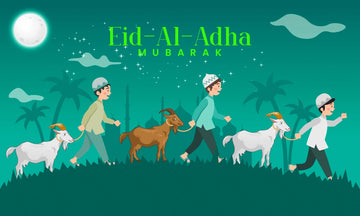What is Eid ul Adha 2023?
Muslims celebrate Eid ul Adha in a way to recognize the sacrifice Prophet Ibrahim (A.S.) made out of his emphatic faith in Allah. Ibrahim (AS) demonstrated a readiness to sacrifice Prophet Ismail (AS), but Allah substituted a lamb for his son. Allah made this act of faith a permanent part of Muslim life because He was so pleased with the submission to Ibrahim (A.S.).
When is Eid ul Adha 2023?
The glimpsing of the new moon in Dhul-Hijjah, the Islamic calendar's twelfth and last month, will decide the day of Eid ul Adha. On 19 June 2023, the bow moon is supposed to show up. If the moon is visible on that day, it will mark the beginning of Dhul-Hijjah. Eid ul Adha is celebrated always on the tenth day of Dhul-Hijjah.

Eid Prayer
The ruling regarding Eid prayers was divided among the academics. However, many scholars believe that attending both Eid prayers is a Wajib (obligation) based on evidence, so everyone should go. Aside from supplication, the Eid sermon (after Eid pray) has additionally been made an essential piece of this social affair and the request.
1- The ideal opportunity for Eid prayer with God starts from the time the sun is three meters over the skyline until the sun arrives at its meridian. On the other hand, it is preferable to offer the prayer shortly after sunrise. Dawud Abu: 1135)
2- Eid Prayer is accomplished without any Iqmah or Athan. [Sahih Muslim: 885 (b)}
3- Eid prayer consists of two Rakat, during which Tabkeer (Allah-u-Akbar) is announced seven times. (Abu Dawud: 1149)
Muslims greet one another with greetings like Happy Eid and Eid Mubarak. However, Muslims prefer to wish their friends and fellow Muslims Eid Mubarak, the most common Eid greeting.
How exactly is Eid ul Adha observed?
The Islamic world observes Eid ul Adha as a public holiday in countries where Islam is a predominant religion. Regardless of nationality, ethnicity, or locality, the primary observance of Eid ul Adha is the symbolic reenactment of obedience to Prophet Ibrahim. Depending on where the celebration is held, the animal sacrificed might be a cow, sheep, lamb, goat, ram, or camel.
The proper distribution of the bounty is required; 33% of the meat has a place with the individual, gathering, or family offering the penance, and another third has a place with their loved ones. The remaining third is allotted solely to those needy and less fortunate people.
Muslims observe this Feast of Sacrifice to show their willingness to abandon the will of Allah by performing the Qurbani or sacrificing an animal. During Eid ul Adha, Muslims who possess the necessity to do so are supposed to give cash, food, and apparel to the needy and the oppressed.
However, on a smaller scale than Eid ul Fitr, Muslims use the holiday to spruce up and see loved ones giving and receiving gifts.
The Sacrifice of Animals
The sacrifice of an animal on the day of Eid al Adha is a verified Sunnah of Prophet Ibrahim (A.S.) and of our dearest Prophet Mohammad (S.A.W.). However, some scholars believe that it is Wajib (obligatory).
Sacrificing animals in the path of Allah is a remarkable act of glorification. It brings the person offering the sacrifice near to Allah.
Abu Hurairah (R.A) reported that Prophet (S.A.W.) said:
“Whoever can afford it [sacrifice], but does not propose a sacrifice, let him not come close our prayer area.” (Ibn Majah:3123)
The Hadith cites the significance of sacrificing in the path of Allah. It also retains a warning for those Muslims who have the standards to offer a sacrifice on Eid ul Adha but do not do so due to some worldly basis or lame justification.
Conclusion
Be thankful to Allah for His blessings and the opportunity to carry out this significant Sunnah of Prophet Ibrahim (A.S.) as you celebrate this festival. However, do not forget about your less fortunate fellow Muslims who do not have the means to celebrate this blessed festival.

